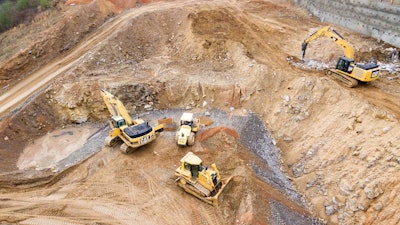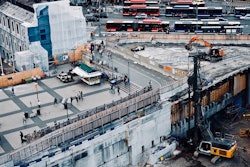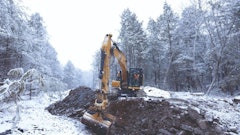
*Editor's Note: This article was originally published May 28 and updated July 14 with additional information.
Impacts from COVID-19 are being felt in many industries, including the global construction industry. This is due in large part to governments around the world enacting shelter-in-place orders as a means of containing and slowing the spread of the virus.
This has lead to a shut down of many businesses including construction projects in some parts of the world. As such, 2020 construction output is anticipated to be slower than originally forecast in many markets.
Read more: Heavy Equipment Manufacturers Alter Operations due to Impacts of COVID-19
Market contraction of 4.3% for South and Southeast Asia
The construction industry in the South and Southeast Asia had slowed in 2019, led by a deceleration in real estate markets across many of the countries including India, which accounts for more than 50% of the region’s construction output. Prior to the onset of the COVID-19 outbreak, the region was expected to regain some of its growth momentum in 2020 to post an expansion of 6%. However, in view of the growing disruption in the region, the industry is now expected to contract by 4.3%, according to GlobalData, a leading data and analytics company.
Apart from India, there were signs of weakness in some other markets in the region, in Malaysia, Vietnam and Thailand, particularly in the real estate segment. Unsold inventories coupled with rising unemployment and liquidity crisis have adversely affected the residential segment in these countries.
The residential sector will continue to struggle as economic activity weakens, remittance declines and unemployment rises. There is a high risk that a considerable proportion of the early stage projects in these sectors will be cancelled or at least pushed back, with few new projects starting in the second half of 2020 as firms review their expansion plans.
Dhananjay Sharma, Construction Analyst at GlobalData, comments, “The lockdown has already affected the industry in the region. There have been varying degree of lockdowns, with the most severe in India, Singapore and Malaysia – during which more than 95% of the projects in the construction industry came to a complete halt with work being allowed only on essential segment projects.”
As a result, the first quarter data for several of the countries in the region has shown signs of the disruption, with Thailand witnessing the highest contraction of 9.9%, followed by Malaysia with a contraction of 7.7%, Singapore by 4%, the Philippines by 3.4%, and India by 2.2%.
There has been positive growth in Indonesia and Vietnam, with the quarterly value data growing by 2.9% in Indonesia and by 4.4% in Vietnam; however, even in these countries the growth rate has decelerated to a decade low. Moreover, with the continuing surge in COVID-19 cases across the region, and the lockdown mostly implemented during the second quarter, the decline in the construction industry would be much more severe in the second quarter.
The infrastructure segment is likely to benefit from the government efforts, although in the short-term, owing to deteriorating fiscal conditions. Lower revenues due to economic slowdown and higher fiscal expenditure to sustain the weaker segments of the population would increase the debt to GDP ratio, thereby limiting government efforts for massive infrastructure investments.
Sharma says, “However, the underlying potential in the region means that there would be a sharp recovery in 2021, followed by robust expansion in the following few years. This would be driven by the buoyant economic state and the rising middle class population, driving consumption growth and leading to investments in housing and infrastructure. Although China is expected to rationalize its investments in the Belt and Road Initiative (BRI), investment from China will continue to boost infrastructure developments in the region.”
Construction growth in Indonesia to slow 0.5%
Before the COVID-19 outbreak, the Indonesian construction industry was expected to continue to grow at a fast pace over the forecast period owing to the government’s plan to drive forward large-scale infrastructure developments. However, reflecting on the recent COVID-19 related disruption and the weaker outlook for economic growth, the construction output growth in 2020 is expected to slow down to just 0.5%, forecasts GlobalData.
The COVID-19 crisis has already impacted the construction industry in the first quarter of 2020. The construction value-add at 2010 constant prices has grown by 2.9% year-on-year during the first quarter of 2020 – the slowest quarterly growth rate since the first quarter of 2002.
Sharma comments, “The disruption in construction activities will peak during the second quarter of 2020 and will start recovering thereafter in the following quarters. The commercial, industrial and residential segments would be the most affected segments while recovery would be supported by the government’s investments in the infrastructure segment.”
The Coordinating Ministry of Economic Affairs plans to revive the economy through a five-phased resumption of businesses and social distancing measures in the country from June 2020 onwards, with economy completely re-opening by late July or early August 2020.
Sharma concludes: “Investments in infrastructure would revive growth once the economy opens completely after COVID-19 subsides. This will be led by the investments in the relocation of the capital city, the work on which has been paused due to the pandemic outbreak.”
 Infrastructure improvement plans in many parts of the world have been paused, at least temporarily, due to the coronavirus pandemic.Unsplash
Infrastructure improvement plans in many parts of the world have been paused, at least temporarily, due to the coronavirus pandemic.Unsplash
French construction industry to contract by 9.4%
The construction industry in France is expected to shrink by 9.4% in 2020, according to GlobalData. This is despite the fact that the construction sector was exempted from the nationwide lockdown that had been in place since mid-March.
Danny Richards, Lead Economist at GlobalData, comments, “Despite the easing of the lockdown and the earlier step of exempting construction from these measures, construction activities have been disrupted due to the stringent measures taken by the government to contain the spread of the virus. Reflecting the disruptions, the French construction industry’s growth fell sharply by 14.1% in the first quarter of 2020.”
The government’s fiscal position is expected to worsen in 2020 due to the increase in government spending and lower economic growth. Consequently, the government may be constrained from investing in infrastructure projects in the long run once the virus outbreak subsides. The French Government had plans to upgrade the country’s infrastructure, with the planned extension of metro lines, road projects, and the building of new residential properties.
Richards adds, “The residential sector was the largest market in the French construction industry, but it was already expected to weaken in 2020 before the COVID-19 crisis, reflecting the declining trend in building permits in recent quarters. Demand for housing is expected to slow significantly this year as unemployment increases and incomes are constrained.”
Projects appear to have been severely disrupted. Vinci, a major French contractor, halted projects temporarily in March and early April, but has since gradually restarted operations. The firm revealed that the virus outbreak was having an adverse impact on business with many projects in France being put on hold, and it is expecting a significant decline in revenues over the coming months.
READ MORE: AEM Examines Economic Impact of COVID on Agricultural Industry
Growth in Philippines construction industry to slow down to 1.2%
According to GlobalData, the Philippines construction industry was growing at a robust pace prior to the COVID-19 outbreak due to ongoing infrastructure investment and the launch of the Philippine Construction Industry Roadmap 2020–2030. However, with the government announcing strict measures to slow the spread of the virus, construction output growth forecast for 2020 is expected to slow down to 1.2% from 8.0% before the COVID-19 outbreak projection, says GlobalData.
The country has started to partially ease restrictions due to the economic strain. All public and private construction projects were allowed to resume in areas under the General Community Quarantine (GCQ) from May 15, 2020, while in the areas under the Enhanced Community Quarantine (ECQ), selected type of priority construction projects were allowed to resume.
Sharma comments, "The country’s construction industry is still expected to benefit from large-scale infrastructure projects, which will likely be advanced when the COVID-19 spread is contained. On May 13, 2020, all major infrastructure projects under the Build, Build, Build (BBB) program were allowed to resume."
Prior to the outbreak, the government had planned to invest around PHP1 trillion (US$18.9bn) on the BBB program this year, and the implementation of the program could play a major role in the post-pandemic economic recovery of the country.
Sharma concludes, "However, the residential market was already struggling due to slowing domestic economy before the virus outbreak."
Sharma adds, "The market is facing further risk as the economy is expected to slump in the second quarter and people take more precautions with regards to property purchases."
 While many construction projects were put on hold, some parts of the world have started allowing work to resume.Pexels
While many construction projects were put on hold, some parts of the world have started allowing work to resume.Pexels
Construction in Sub-Saharan Africa slowing down
GlobalData reports the construction output growth forecast for Sub-Saharan Africa (SSA) has been revised to 2.3%, down from the previous projection of 3.3% (as of mid-April) and 6.0% in the pre-COVID-19 case (Q4 2019 update). The revision reflects the impact on the region’s economic activity and investment growth stemming from the wider global slowdown and the outbreak of COVID-19 in the region. Inflation, spending cuts, widening fiscal slippages, suspending some projects, which could disrupt the construction sector, especially in the oil dependent nations of Central Africa are all the impediment factors that could lead to even lowering that forecast, says GlobalData.
Yasmine Ghozzi, Economist at GlobalData, says, "Nigeria is hit so bad having already suffered economic challenges since late last year. The oil price shock has adversely hit the country with the government possessing very limited buffers to handle the shock. The economy is expected to slip into recession in 2020 as economic activity worsens from a full lockdown in the country’s capital (Abuja) and finance center (Lagos), which is set to last for at least four weeks.
"In addition, the economy will suffer from the sharp spending cuts as the government moves to accommodate the collapse of oil prices, which will undesirably affect the construction sector. The fiscal situation will be challenging to the extent that some states would not generate enough revenues to cover their current spending."
GlobalData expects some sectors to fare relatively well, most notably healthcare infrastructure. Many African countries currently have lockdowns in place knowing their under-resourced healthcare systems cannot deal with large-scale outbreaks. Local manufacturing is another promising sector; the disruption to global supply chains and the impact of depreciating currencies on import costs has re-emphasized the importance of expanding domestic capacity, which could drive investment into industrial construction works. Meanwhile, the COVID-19 outbreak has also revealed the importance of strengthening communications infrastructure, which has already recorded rapid growth in recent years.
Ghozzi concludes, "The pandemic is expected to widen fiscal deficits across the region, particularly in commodity-exporting countries and countries dependent on tourism revenues. While the region embraces economic and fiscal challenges, this will likely prompt shift in the government policies, which will open opportunities for investors despite a slow recovery overall."




















